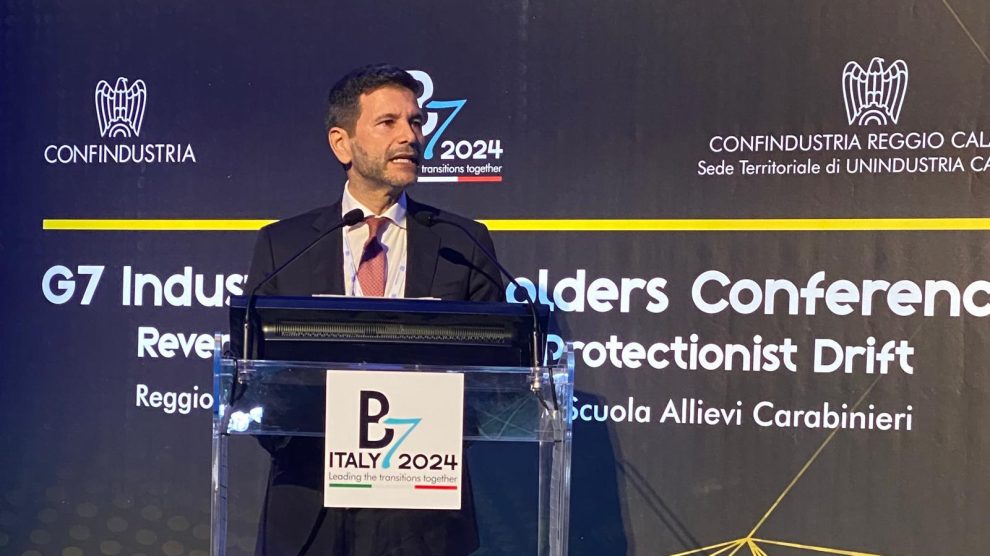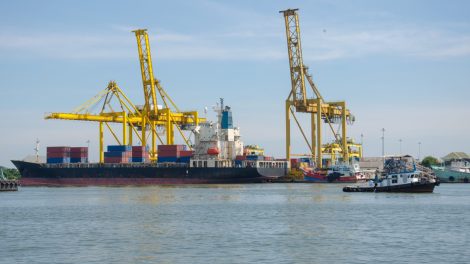Our world stands at the crossroads of profound economic, geopolitical, and social transformations.
In recent years, we have witnessed significant disruptions in global markets, exacerbated by geopolitical tensions and unprecedented challenges like the COVID-19 pandemic and the conflict in Ukraine.
These events have highlighted the vulnerabilities in our global value chains and underscored the necessity of robust and resilient economic systems.
Trade and investment are not just economic activities. They are powerful drivers of sustainable development, growth, and poverty reduction. They enable better resource allocation, drive innovation, and create jobs.
By fostering open and inclusive trade, we can help ensure that the benefits of globalisation are widely shared, lifting many out of poverty and promoting social cohesion.
In this scenario, the G7 – as a group of like-minded countries and its meeting of trade Ministers now starting – has a central role to play in shaping the current and future global economic landscape.
To best deliver a fair and level playing field for businesses to compete, the B7 and today’s discussions are crucial.
Our collective insights and recommendations are vital as they contribute to the G7 Trade Ministers’ agenda. We can set the tone for a global economy that prioritises sustainability, equity, and resilience.
These objectives require, as was also mentioned in previous panels, continued support for a rules-based multilateral trading system, enhanced through decisive reform of the World Trade Organization (WTO), ensuring all countries can participate in and benefit from global trade.
At the same time, in today’s polarised world, striking a balance between economic security and free markets is crucial.
Multilateral cooperation must be underpinned by fair competition, predictability, and sustainability. It is important to keep economies open and competitive while also tackling non-market policies and practices that distort markets.
The fragility of global value chains has then been starkly revealed by recent crises. To enhance resilience, we must consider strategic partnerships that ensure security while maintaining the benefits of an open and global trading system.
Friendshoring and nearshoring are strategies that, if balanced with global trade openness, can diversify supply sources and enhance stability without leading to isolationism.
Many African countries have said they wouldn’t ask for help from other countries if the West had given them more support. This statement is revealing and implies a request and a need for a lasting, consistent and stable partnership.
The Mediterranean region and Africa offer significant opportunities for securing global value chains.
Initiatives like the Mattei Plan for Africa, based on a logic of mutual benefit, aim to foster collaboration and create a more integrated and resilient economic area.
By leveraging such opportunities, we can contribute to a more balanced and diversified global economy.
SIMEST, supporting Italy’s private companies’ internationalisation, contributes to this effort through a subsidised finance tool, ‘Measure Africa’, for companies investing in the continent.
Supporting investments in export and internationalisation is crucial as they also bring managerial expertise, technology, and access to international markets.
Risk mitigation mechanisms, such as guarantees and insurance schemes, are also essential enabling factors. These help businesses manage the uncertainties of operating in foreign markets, making global expansion more feasible.
The enabling factors for trade and investments are set: it is important to ensure their benefits are widely distributed, allowing for sustainable development.
Enhanced partnerships between the public and private sectors are necessary. By mobilising private savings, improving access to capital markets and aligning economic policies with environmental and social goals, we can promote a green and inclusive recovery, ensuring that no one is left behind.
The G7 commitments under the Partnership for Global Infrastructure and Investment (PGII) are paramount in this regard. PGII, a collaborative effort to finance 600 billion dollars of quality infrastructure abroad, is intended to create goodwill and strategic partnerships, enabling sustainable economic growth and better trade between the G7 and partner countries.
These efforts are now focused on the development of transformative economic corridors, as the Lobito Corridor, the Luzon Corridor and the India-Middle East-Europe Economic Corridor.
To support these PGII efforts, the Cassa Depositi e Prestiti (CDP) Group has been mandated by the G7 to establish the G7 Expert Group on Development Finance for Infrastructure and Investment. By bringing together Experts from the G7 Public Development Banks and Development Finance Institutions, the Expert Group is working on a 2024 Joint Action Proposal on sustainable infrastructure investment in Africa.
Setting this up has been possible as the CDP Group, including SIMEST, has been coordinating a dialogue mechanism among G7 Public Development Banks and Development Finance Institutions to discuss initiatives for presentation to G7 governments in 2024.
Public Development Banks and Development Finance Institutions play a critical role, providing the enabling factors for private sector investment. They act as bridges, using public resources to catalyse private investment and provide technical and risk mitigation support.
For this reason, the CDP Group has participated in this year’s B7 initiatives, providing our opinion on increasing trade and investments and how institutions can facilitate public-private partnerships.
Thanks to the B7 efforts, we can navigate the complexities of the contemporary landscape and build a resilient global economy that is more inclusive and sustainable.
I look forward to the following productive discussions and the actionable outcomes that will emerge from the panel.





